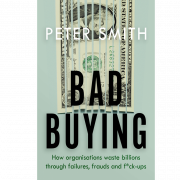Disqualifying Suppliers from Government Contracts
It feels like the new UK Procurement Bill has been moving through Parliament for years – it is only a year in fact, although before that there was an extended period of consultation.
One of the themes of the Bill is that it should be easier for the contracting authority (CA) to “bar” or disqualify suppliers from bidding altogether. That has been possible for many years if the supplier or one of its directors had committed certain criminal acts, but the new legislation includes exclusion for poor performance for the first time. There is also exclusion for “improper behaviour” which has led to a supplier gaining an unfair advantage in the competitive process.
However, the authority will also have some flexibility. The new rules mean that the existence of a mandatory or discretionary exclusion ground is not enough in itself to throw the bidder out of the process. The CA has to first decide if the circumstances giving rise to the exclusion are likely to happen again. That’s quite a difficult and potentially controversial assessment to ask the buyer to make, in my view. There is also going to be a centrally-managed list of firms that have been barred.
It will be interesting to see whether there will really be any significant change of behaviour in this area. In truth, CAs are very cautious about barring firms, fearing I suspect legal challenge and endless argument getting in the way of running the actual procurement process. I’m not sure that will change.
An interesting example of this unwillingness was reported recently on the Nation Cymru website. Campaigners have accused a National Health Service Trust of ignoring anti-fraud regulations by allowing two firms that have been convicted of bid-rigging to form part of a consortium to build a new cancer centre in South Wales. The Acorn Consortium is the preferred bidder for constructing the new Velindre Hospital in Cardiff. That project has faced strong opposition on environmental and medical grounds, and it is those against the construction who have raised this issue.
Nation Cymru has described how two of the consortium members – the Kajima group and Sacyr – have been found guilty of fraud offences in Japan and Spain respectively. As the website reported,
“Kajima was sentenced for bid-rigging in March 2021, with one of its executives receiving a suspended prison sentence and the company itself being fined 250 million yen (around £1.53m) for its role in the scandal, which involved a number of firms colluding with each other on the construction of a railway line to maximise their profits. Sacyr received a penalty of €16.7m in July 2022 for its part in creating a cartel aimed at aligning bids for government contracts”.
When asked why this had not led to exclusion, a Velindre University NHS Trust spokesperson responded: “The robust procurement process has been undertaken in line with procurement law, UK and Welsh government policy and all required due diligence has been undertaken.”
I’m not sure that’s a good enough explanation really. When the spokesperson was asked to explain in more detail why “regulation 57” (which covers this sort of thing) did not apply or was over-ruled here, they “did not offer an explanation”. I do think they should say more.
But conceptually it’s a tricky one. With my buyer’s hat on, do I really want to kick out what presumably is my best bidder because two possibly quite minor consortium members did something bad hundreds or thousands of miles away? On the other hand, we do have regulations for a purpose.
In terms of the justification, having had a quick read of “regulation 57” (it’s some time since I studied “the regs”), I suspect the answer lies in the famous “self-cleaning” clause. That says, “Any economic operator that is in one of the situations referred to in paragraph (1) or (8) may provide evidence to the effect that measures taken by the economic operator are sufficient to demonstrate its reliability despite the existence of a relevant ground for exclusion”.
So basically, if a supplier can show that it has taken lots of steps to make sure it will never, ever get involved in bid-rigging again, or any of the other reasons for mandatory OR discretionary exclusion, and the buyer is naïve enough – sorry, I mean if the buyer analyses those declarations and decides they are valid, then the supplier is back in the game.
You can see the logic in this, but it is a bit of a “get out of jail” card really. It’s also another reason why in practice, we so rarely see suppliers barred. It will be interesting to see whether anything changes once the new Bill has been implemented – but I have my doubts. Barring is potentially just so fraught with hassle and risk.









Leave a Reply
Want to join the discussion?Feel free to contribute!